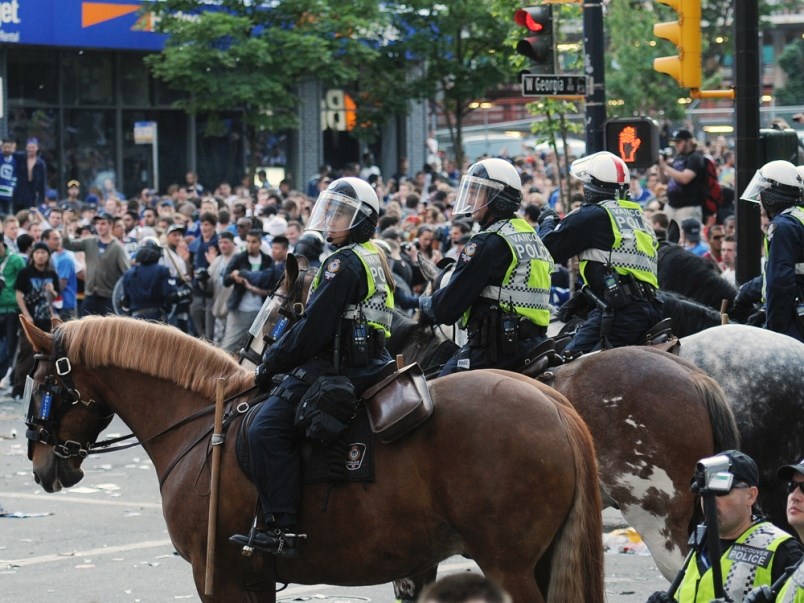The $1.6 billion draft budget, which council will review next month, is based on a five per cent property tax increase and requires the city to dip into $57 million in reserve funds normally used for snow removal and storm clean-up.
“Going forward, city revenues are not anticipated to return to pre-2020 levels, and draws on the stabilization reserve will again be required in 2021,” said city manager Sadhu Johnston in remarks attached to budget documents released Tuesday.
“This is not a sustainable financial model, and if revenues do not return to pre-COVID levels in 2022, significant service reductions would be required to balance the city’s operating budget.”
How the budget cuts affect police
A city staff report released with the documents recommends the Vancouver Police Department see a reduction of $3.1 million, or one per cent, from its overall budget, the implementation of which to be at the discretion of the Vancouver Police Board.
That cut could mean holding vacancies or reducing staff.
At the same time, the report recommends a $4.5 million increase over the police’s 2020 budget amounts for compensation connected to fixed costs for existing staff related to collective agreements, “including annualization of the budget for 2020 new hires and step/rank increases for existing staff.”
The report notes Johnston’s request earlier this year was not met by the police department to reduce its budget to offset city-wide revenue loss related to the pandemic.
“The VPD and the Vancouver Police Board did not agree with or support this vacancies approach and will work toward reversing the imposed reduction, as it will have negative impacts on existing staff and service levels, such as creating longer response times and employee burnout,” the report said.
In June, Glacier Media reported that five city councillors supported the need for the VPD to trim one per cent from its $315 million budget to fall in line with other city departments that cut costs to offset revenue loss related to the pandemic.
City staff layoffs, pay cuts
The city’s revenues have been hit hard by the pandemic, with staff projecting in May a shortfall of $136 million. That dire financial picture led to temporary layoffs of more than 1,800 workers and all non-unionized staff put on mandatory furlough, which was equivalent to a 10 per cent pay cut.
Annual inflationary increases were delayed or cancelled for staff. Mayor Kennedy Stewart and councillors also took 10 per cent pay cuts. Community centres and other facilities, including libraries, were closed.
Parking enforcement, which generates up to $100 million per year in revenue, was temporarily suspended until activated again at the end of April.
The city also spent $13 million on its response to the COVID-19 pandemic, including support for housing, food, hygiene and other services for people and communities disproportionately impacted by the pandemic.
City staff now say the shortfall has been reduced to $85 million.
The amount is despite the city recently receiving $16 million in funding from the provincial and federal governments to assist in recovery from the pandemic; the mayor had anticipated $60 million from governments.
“Given the city has restarted most of its public services and reopened most facilities, we will need to continue to manage costs closely,” Johnston said. “This will include all city departments maintaining staffing vacancies of between one to two per cent, which will, in turn, have service impacts in a number of areas.”
As for capital projects, Johnston said many were delayed this year and will flow into 2021 for completion. Overall, the four-year capital plan has been reduced by $250 million to $2.6 billion, with spending next year to be more than $770 million.
What all these numbers mean for taxpayers is that it will cost more to live in Vancouver.
If approved by council, a five per cent property tax hike would amount to the following average tax increase amounts for 2021 — based on median property values in each category, and after adjusting the council-directed tax shift from businesses to homes:
• $146 for a single-family home assessed at $1.6 million.
• $64 for a condo or strata unit assessed at $688,000.
• $166 for a business property assessed at $1 million.
A news release from the city Wednesday said the actual tax bill for each property owner will be different than the average amounts listed, “and will depend on the assessed value of the property, as well as the relative assessed value of that property to others in the same area.”
BC Assessment determines the assessed value.
The tax bills do not include anticipated increases for utility fees such as sewer, water and solid waste, or increases in recreation and permit fees for residents.
The final property taxes and fees for 2021 will be set once council approves a final budget, which is expected to occur Dec. 8.
@Howellings




